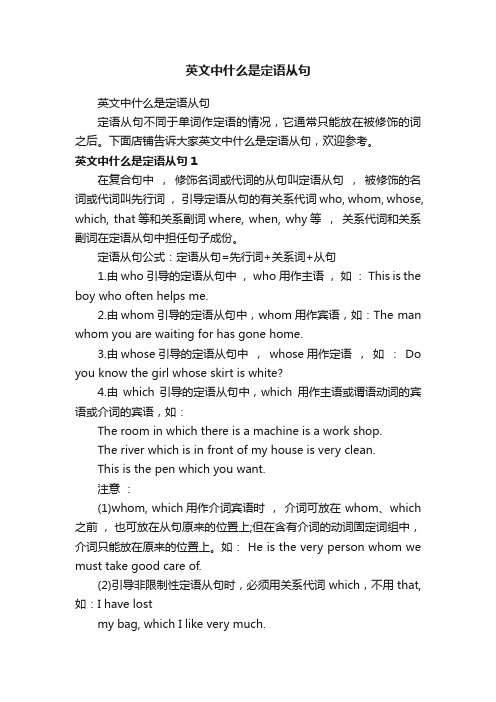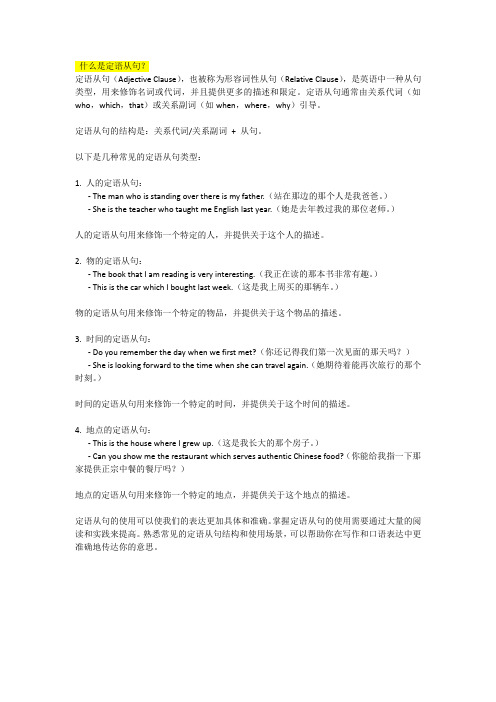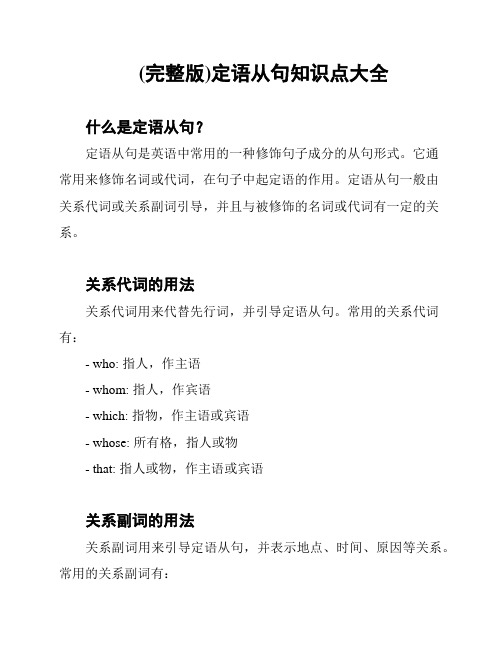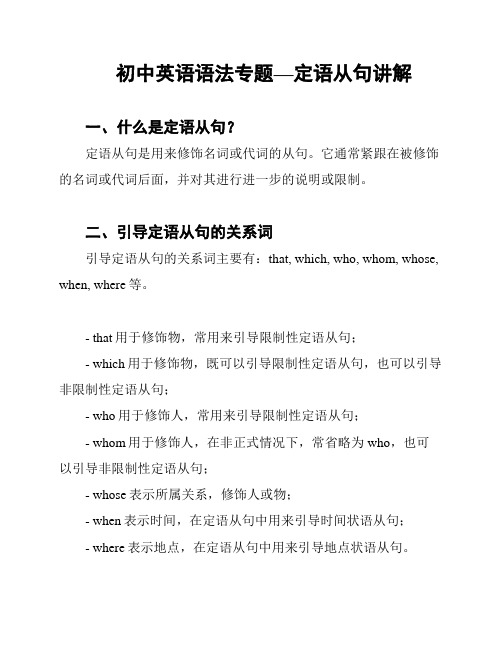英语定语从句简介
定语从句的定义

定语从句的定义1.定语从句:定语从句(Relative Clause)是一种修饰名词或代词的从句,它以关系代词或关系副词引导,把一个句子变成一个修饰名词或代词的成分。
它可以放在句子中表示主句的主语,宾语,表语,同位语或定语,其中,最常见的是定语从句,也就是用来修饰名词或代词的定语从句。
2.定语从句的结构:定语从句的结构一般由关系代词或关系副词引导,它们可以是who,whom,that,which,whose,when,where,why等。
3.定语从句的用法:定语从句可以用来修饰名词或代词,表示主句的主语,宾语,表语,同位语或定语。
4.定语从句的种类:定语从句可以分为限制性定语从句和非限制性定语从句,限制性定语从句一般由关系代词或关系副词引导,表示对主句所提到的名词或代词的限定,而非限制性定语从句一般由关系副词引导,表示主句所提到的名词或代词的非限定性修饰。
5.定语从句的语序:定语从句的语序一般是陈述语序,即主语在前,谓语在后,例如:The man who is standing at the gate is my father。
6.定语从句的省略:在定语从句中,当关系代词或关系副词在句中作主语时,可以省略,例如:The man (who) I saw in the street ismy father。
7.定语从句的替换:在英语中,定语从句的替换是指用关系代词或关系副词替换其他的名词或代词,例如:The book (which/that) I bought yesterday is very interesting。
8.定语从句的复合结构:定语从句的复合结构是指以定语从句为基础,加上定语从句的限定语,形成的复合句结构,例如:The man who is wearing a black coat is my father。
9.定语从句的并列:定语从句的并列是指在一个句子中,用两个或两个以上的定语从句修饰同一个名词或代词,例如:The man who is wearing a black coat and who speaks English fluently is my father。
英文中什么是定语从句

英文中什么是定语从句英文中什么是定语从句定语从句不同于单词作定语的情况,它通常只能放在被修饰的词之后。
下面店铺告诉大家英文中什么是定语从句,欢迎参考。
英文中什么是定语从句1在复合句中,修饰名词或代词的从句叫定语从句,被修饰的名词或代词叫先行词,引导定语从句的有关系代词 who, whom, whose, which, that等和关系副词where, when, why等,关系代词和关系副词在定语从句中担任句子成份。
定语从句公式:定语从句=先行词+关系词+从句1.由who引导的定语从句中, who用作主语,如: This is the boy who often helps me.2.由whom引导的定语从句中,whom用作宾语,如:The man whom you are waiting for has gone home.3.由whose引导的定语从句中,whose用作定语,如:Do you know the girl whose skirt is white?4.由which引导的定语从句中,which用作主语或谓语动词的宾语或介词的宾语,如:The room in which there is a machine is a work shop.The river which is in front of my house is very clean.This is the pen which you want.注意:(1)whom, which用作介词宾语时,介词可放在 whom、which 之前,也可放在从句原来的位置上;但在含有介词的动词固定词组中,介词只能放在原来的位置上。
如: He is the very person whom we must take good care of.(2)引导非限制性定语从句时,必须用关系代词which,不用that,如:I have lostmy bag, which I like very much.(3)关系代词在句中作主语时,从句的谓语动词的人称和数必须和先行词保持一致。
英语中什么是定语从句

英语中什么是定语从句定语从句是初中英语的一个重要知识点,下面总结了英语定语从句的相关知识点,供大家参考。
什么是定语从句定语从句(也称关系从句、形容词性从句),一个句子跟在一个名词或代词(先行词)后进行修饰限定(对词句进行补充、修饰、限定,进而使原句内容更完整),就叫做定语从句。
按语法句式,定语从句在整个句子中做定语的成分。
被修饰的词叫先行词。
定语从句不同于单词作定语的情况,它通常只能放在被修饰的词(即先行词)之后。
定语从句由关系词(关系代词、关系副词)引导,关系代词、关系副词位于定语从句句首。
定语从句易错易混点归纳1.关系代词和关系副词的混用。
例:I’ll never forget the days when I spent in New York with you.改:when应改为which或that。
2.固定句式出差错。
例:Mary is so lovely a girl as everybody loves her.改:as应改为that。
3.主谓不一致。
例:Tom is one of the students who likes swimming.改:likes 应改为like。
4.与强调句型及其他句型的混合。
例:Was it in the shop that you bought the recorder that you lost your pen?改:第一个that应改为where。
5.特殊名词作先行词时关系词的选取错误。
例:I don’t like the way which you speak to her.改:应在which前加in或将which改为that或去掉。
例句1.窗户朝南的那间房间是我的。
The room whose window faces south is mine.=The room of which the window faces south is mine.2.我们正在看的这幢大楼过去曾经是一家医院。
(完整版)定语从句讲解

1一、定语从句概述定语可以由形容词、名词、代词、数词、分词、副词、不定式以及介词短语 等来担任,也可以由一个句子来担任。
在句子中起定语作用的从句称为定语 从句。
定语从句在句中的作用相当于形容词,故又称为形容词性从句。
被定 语从句修饰的名词叫先行词,引导定语从句的词叫关系词。
二 关系词的用法。
关系词可分为关系代词和关系副词。
关系词指代先行词,放在先行词与 定语从句之间起连接作用,同时又充当定语从句中的某一种成分(主语、宾 语、状语等)。
引导定语从句的关系代词有"at ,who ,whom ,whose ,which;关系副词有 when ,where ,why 等。
关系词在句子中的指代作用及成分如下表 1.关系代词的用法(1) who, whom 的用法二者都用于指人。
who 在定语从句中作主语、宾语;whom 在定语从句中 作宾语。
在现代英语里,有时who 也可代替whom 在从句中作宾语。
作 宾语的关系代词who ,whom 可以省略(介词后作宾语的关系代词除外)。
She was the one who did most of the talking 。
大部分时间都是她在说话。
(作主语) The boy who I know studies best in his class.我认识的那个男孩在班上学习最好。
(作宾语)I happened to meet the professor (who/whom) I got to know at a party. 我碰巧遇见了那位在一次聚会上认识的教授。
(作宾语,whom 可用who 代替) whom 在从句中作介词的宾语,且介词提到whom 前面时,不能用who 代替。
Yesterday I came across a few friends with whom I went to the park .昨天 我碰见了几个朋友,我和他们一起去了公园。
什么是定语从句

什么是定语从句?定语从句(Adjective Clause),也被称为形容词性从句(Relative Clause),是英语中一种从句类型,用来修饰名词或代词,并且提供更多的描述和限定。
定语从句通常由关系代词(如who,which,that)或关系副词(如when,where,why)引导。
定语从句的结构是:关系代词/关系副词+ 从句。
以下是几种常见的定语从句类型:1. 人的定语从句:- The man who is standing over there is my father.(站在那边的那个人是我爸爸。
)- She is the teacher who taught me English last year.(她是去年教过我的那位老师。
)人的定语从句用来修饰一个特定的人,并提供关于这个人的描述。
2. 物的定语从句:- The book that I am reading is very interesting.(我正在读的那本书非常有趣。
)- This is the car which I bought last week.(这是我上周买的那辆车。
)物的定语从句用来修饰一个特定的物品,并提供关于这个物品的描述。
3. 时间的定语从句:- Do you remember the day when we first met?(你还记得我们第一次见面的那天吗?)- She is looking forward to the time when she can travel again.(她期待着能再次旅行的那个时刻。
)时间的定语从句用来修饰一个特定的时间,并提供关于这个时间的描述。
4. 地点的定语从句:- This is the house where I grew up.(这是我长大的那个房子。
)- Can you show me the restaurant which serves authentic Chinese food?(你能给我指一下那家提供正宗中餐的餐厅吗?)地点的定语从句用来修饰一个特定的地点,并提供关于这个地点的描述。
定语从句知识点总结简单

定语从句知识点总结简单一、定语从句的概念定语从句是指修饰名词或代词的从句,用来限定或描述这个名词或代词的性质、特征等。
定语从句通常放在被修饰的名词或代词之后,用以补充说明名词或代词所指的具体内容。
二、定语从句的结构定语从句的结构包括先行词、关系代词或关系副词以及从句三个部分。
1. 先行词:即被定语从句修饰的名词或代词,通常在定语从句的前面。
2. 关系代词:在定语从句中起连接作用的代词,包括who, whom, whose, which, that等。
3. 关系副词:在定语从句中起连接作用的副词,包括where, when, why等。
三、关系代词和关系副词的用法1. who/whom/whose:关系代词,用来引导修饰人的定语从句。
例如:The girl who is standing there is my sister.The man whose car was stolen has reported to the police.2. which/that:关系代词,用来引导修饰物的定语从句,which一般只用于非限制性定语从句。
例如:The book which is on the table is mine.The pen that I lost last night is found.3. where:关系副词,用来引导修饰地点的定语从句。
例如:This is the school where I study.4. when:关系副词,用来引导修饰时间的定语从句。
例如:That was the day when we met for the first time.5. why:关系副词,用来引导修饰原因的定语从句。
例如:I don't understand the reason why he left so suddenly.以上是关系代词和关系副词的基本用法,需要根据具体的语境来选择适当的关联词。
(完整版)定语从句知识点大全

(完整版)定语从句知识点大全什么是定语从句?定语从句是英语中常用的一种修饰句子成分的从句形式。
它通常用来修饰名词或代词,在句子中起定语的作用。
定语从句一般由关系代词或关系副词引导,并且与被修饰的名词或代词有一定的关系。
关系代词的用法关系代词用来代替先行词,并引导定语从句。
常用的关系代词有:- who: 指人,作主语- whom: 指人,作宾语- which: 指物,作主语或宾语- whose: 所有格,指人或物- that: 指人或物,作主语或宾语关系副词的用法关系副词用来引导定语从句,并表示地点、时间、原因等关系。
常用的关系副词有:- where: 表示地点- when: 表示时间- why: 表示原因定语从句的形式定语从句可以是限制性的,也可以是非限制性的。
限制性定语从句限制性定语从句是对先行词进行限定和修饰的从句,如果去掉,整个句子的意思就不完整或失去了关键信息。
限制性定语从句通常使用关系代词和关系副词引导,关系代词在从句中作主语或宾语。
非限制性定语从句非限制性定语从句是对先行词进行补充说明,它对整个句子的意思并不具有限制作用,就算去掉也不会影响主句的表达。
非限制性定语从句通常使用逗号将其和主句隔开,关系代词在从句中作主语或宾语。
定语从句的位置定语从句可以放在先行词之后,也可以放在先行词之前。
定语从句的例句- I have a friend who lives in New York.(非限制性定语从句)- The book that you borrowed is on the desk.(限制性定语从句)以上就是关于定语从句的一些基本知识点。
定语从句在英语语法中是一个重要的内容,掌握好定语从句的用法可以有效地提升我们的写作水平。
希望本文对您有所帮助!。
初中英语语法专题—定语从句讲解

初中英语语法专题—定语从句讲解一、什么是定语从句?定语从句是用来修饰名词或代词的从句。
它通常紧跟在被修饰的名词或代词后面,并对其进行进一步的说明或限制。
二、引导定语从句的关系词引导定语从句的关系词主要有:that, which, who, whom, whose, when, where等。
- that用于修饰物,常用来引导限制性定语从句;- which用于修饰物,既可以引导限制性定语从句,也可以引导非限制性定语从句;- who用于修饰人,常用来引导限制性定语从句;- whom用于修饰人,在非正式情况下,常省略为who,也可以引导非限制性定语从句;- whose表示所属关系,修饰人或物;- when表示时间,在定语从句中用来引导时间状语从句;- where表示地点,在定语从句中用来引导地点状语从句。
三、定语从句的位置和用法定语从句可以位于句首、句中或句尾,用来修饰名词或代词。
它可以进一步说明名词的性质、特征、来源等。
以下是一些示例:1. The book that you borrowed from me is very interesting.that you borrowed from me is very interesting.你从我这里借的那本书非常有趣。
2. The girl, who is wearing a red dress, is my sister.who is wearinga red dress, is my sister.那个穿红裙子的女孩是我的妹妹。
3. The city where I was born is very beautiful.where I was born is very beautiful.我出生的城市非常美丽。
4. I have a friend whose father is a doctor.whose father is a doctor.我有一个朋友,他的父亲是医生。
- 1、下载文档前请自行甄别文档内容的完整性,平台不提供额外的编辑、内容补充、找答案等附加服务。
- 2、"仅部分预览"的文档,不可在线预览部分如存在完整性等问题,可反馈申请退款(可完整预览的文档不适用该条件!)。
- 3、如文档侵犯您的权益,请联系客服反馈,我们会尽快为您处理(人工客服工作时间:9:00-18:30)。
语法1( )1. How dangerous! She was driving the car with one hand and holding an ice cream with ____.A. the otherB. anotherC. othersD. other( )2. _____ they are very tired, they feel happy because t hey’ve finally finished their project.A.SoB. AlthoughC. IfD. But( )3. Yesterday evening, I _____ along the street when I suddenly met my maths teacher.A. walkB. walkedC. was walkingD. am walking ( )4. The story ______ I read the newspaper was about a common problem among teenagers.A.whoseB. whoC. thatD. where( )5. May I have a rest? I have already finished ______ the report.A. writeB. writingC. to writeD. written( )6. –Excuse me, can I smoke here?--No, ______.A. you mustB. you’d not betterC. you canD. you’d better not( )7. –I feel a bit hungry now.-- Why not _____ for dinner with us?A. goB. did you goC. to goD. do you go( )8. The actress is already 50, but she looks ______ than she really is.A. youngB. more youngC. more youngerD. much younger( )9. I hear the tall girl wearing glasses is your new classmate. She’s from America, _____ ?A. has sheB. isn’t sheC. hasn’t sheD. does she( )10. I can’t remember _____ I put the book, and I need it for my homework now.A. whereB. howC. whatD. why16.--Is this ____book you were talking about yesterday?--Yes,thank you very much.A.a B.all C. the D.不填17. I asked her _____the bag because it was too expensive.A. not to buyB. to buy not C.not buying D.not buy 18.--It’s surprising that he got such a high mark!--Yes. I wonder ________ it.A.how did he do B.how he did C.why did he do D.that he did1 9.Although you may meet some difficulties,you should never ______.A.turn up B.get up C.give up D.grow up20.You _______ be hungry after the long walk.Help yourself to some cakes.A.can’t B.shouldn’t C.need D.must21.--I’ve got the final Harry Potter book.--You will love it. I ______ it twice already.A.am reading B.have read C.was reading D.will read22.--Do you like this movie?一Yes,it's the _____ one I’ve ever seen.A. better B.best C.good D.well23.He has to earn lots of money ______he can buy his children nice food and clothes.A.so that B.such that C.that D.in order24.Ms Wang is an excellent teacher. ______ in our class loves her.A.Someone B.No one C.Everyone D.Anyone25.Whenever he was late,he could find plenty of excuses ____ sounded reasonable.A.who B.where C.when D.which16. What kind of gifts and things do people buy during _________ major festivals like _________ Christmas and _________ Spring Festival?A. the; /; theB. /; the; /C. the; the; theD. the; /; /17. You _________ take more than two of these pills at once. Three _________ be fatal.A. will; mustB. mustn’t; mightC. need; willD. would; ought to18. Faced with the _________ result, Chinese football fans took on _________ expression.A. disappointing; disappointingB. disappointed; disappointedC. disappointing; disappointedD. disappointed; disappointing19. I prefer a street in a small town to _________ in a big city _________ Shanghai.A. that; soB. one; asC. it; likeD. one; like20. I mean _________ that missing this flight means _________ for another day.A. to say; to waitB. saying; waitingC. to say; waitingD. saying; to wait21. It’s surprising that your brother _________ Russian so quickly—he hasn’t lived there very long.A. picked upB. looked upC. put upD. made up22. —Are you satisfied with the result of the discussion? —Not at all. I can’t have _________.A. a worse oneB. a better oneC. the worst oneD. the best one23. —Remember the first time we _________, Ed? —Of course, I do. You _________ a song on the stage.A. have met; sangB. met; were singingC. met; sangD. have met; have sung24. Many countries are now setting up national parks _________ animals and plants can be protected.A. whenB. whichC. whoseD. where25. Lily, _________ get such a good dictionary?A. where do you think can IB. do you think where I canC. do you think where can ID. where do you think I canThe Chinese river pig needs help!The Chinese river pig is actually a porpoise(江豚). It ____26_____ a “river pig”because its flat and small nose remind people of a pig. River pigs live in the Yangtze River. Adults are usually about 1.55 metres long and ____27_____ about 3-45 kilograms, and they are dark grey in ____28_____. Though they can eat almost anything, they love to eat prawns and fish. River pigs are shy ____29_____ often swim away from boats and people. However, sometimes they like to show off by ____30_____ in the water on their tails. River pigs like to travel in groups of three or four, though groups of fifty have been seen.The river pig used to be quite common. However, it is now a(an) ____31_____ animal. Recently, scientist could only find 380 river pigs in the Yangtze River and as ____32_____ as 1,000 river pigs are now living in the wild.The river pig is in danger because of human activity. Pollution in the Yangtze River is killing prawns and fish, so the river pig does not have enough food ____33_____. We need to cut down the pollution in the Yangtze River and create new nature reserves. ____34_____ the help of these nature reserves, the river pigs can be saved, but we need to act now ____35_____it is too late.26. A. call B. calls C. called D. is called27. A. weigh B. weighs C. are weighted D. are weighed28. A. colourful B. coloured C. colour D. colours29. A. or B. but C. and D. however30. A. standing B. stand C. stood D. to stand31. A. endanger B . endangered C. danger D. dangerous32. A. little B. less C. fewer D. few33. A. to eat B. to be eaten C. eating D. eaten34. A. Under B. In C. At D. With35. A. if B. after C. before D. WhenPeople all over the world celebrate Valentine’s Day.However, the holiday 26 differently in different countries 27 each culture has its own Valentine’s Day customs.For example,people in the United States and Japan both celebrate Valentine’s Day 28 February 14.But in Japan,only romantic partners come together, while in America,it can be shared by anyone 29 is close,friend or lover.Chocolate is the most preferred gift in the US 30 it is common in Japan,too.However, in the US other kinds of gifts are 3 1 given,and many people exchange cards.The biggest 32 is that in Japan,only girls and women.33 chocolates to boys and men,but in the US boys and girls will give cards or small gifts to all of 34 friends.And while American men and women both receive gifts,women usually get 35 expensive gifts than men.That’s why I would like to be a man in Japan but a woman in the US!26.A.celebrates B.is celebrating C.celebrated D.is celebrated 27.A.although B.where C.because D.if28.A.on B.in C.at D.by29.A.whom B.who C.whose D.which30.A.so B.as C.and D.or31.A.too B.either C.neither D.also 32.A.difference B.differences C.different D.differently 33.A.give B.to give C.giving D.given 34.A.theirs B.they C.them D.their35.A.many B.more C.few D.fewerJack worked in a shop that sold clocks. He was always telling Harry 1 a new clock. But Harry, 2 lived next door to Jack, said he didn’t need one.“ 3 needs a clock,” Jack said. “How do you know when it’s time to get up?”“My landlord Mr. Smith turns on his radio at seven o’clock and listens 4 the news,” Harry said. “That’s my morning call.”“Ok. But how do you know when to go to work?”“By the time I 5 my breakfast, it’s eight o’clock, time to leave for the office. Then I walk there. When I arrive at my office, it’s nice o’clock. That’s 6 time I start work.”“Ok. But how do you know when it’s time to go home?”“The factory bell7 ” Harry told him.“But how do you know when it’s time to go to bed?”“The television programs come to end.”By now Jack was really 8 . “Ok,” he shouted. “Now tell me what would happen 9 you wo ke up in the middle of the night and wanted to know the time.”“That’s easy,” Harry said, “I would knock heavily on10 wall. Then you would shout at me, ‘What are you doing knocking on my wall at three o’clock in the morning?’”( )1.A. to buy B. buying C. bought D. buy( )2.A. which B. whose C. that D. who( )3.A. No one B. Neither one C. Everyone D. Someone ( )4.A. at B. to C. in D. on ( )5.A. eats B. have eaten C. ate D. was eating ( )6.A. a B. an C. the D.不填( )7.A. ring B. rings C. was rung D. ringing ( )8.A. anger B. angrily C. angry D. angering ( )9.A. if B. that C. why D. how ( )10.A. his B. their C. her D. Your定语从句一.引导词:人:who,whom物:that,which,where,when二.考点:1.定从分为限定性定语从句和非限定性定语从句2.限定性从句中that 和which的特殊情况3.遇上介词,which和where的互换三.详解1.以下情况只能用that:(1)有all ,everything,”+thing”,little,few,none等不定代词(2)有no ,every,much, some, any, only等限定词修饰时(3)先行词被序数词或最高级修饰(4)有人也有物(5)先行词前有“wh-”特殊代词,如what,which(6)先行词为主句或从句的表语2.(1)介词+which = where(2) why= for whichWhose=of whom1. A football fan(球迷) is _____ has a strong interest in football.A. a thing thatB. something thatC. a person whoD. what2. The house, _____ was destroyed in the terrible fire, has been repaired.A. the roof of whichB. which roofC. its roofD. the roof3. Can you lend me the novel _____ the other day?A. that you talkedB. you talked about itC. which you talked withD. you talked about5. They talked for about an hour of things and persons _____ they remembered in the school.A. whichB. thatC. whoD. whom6. Who _____ has common sense(常识) will do such a thing?A. whichB. whoC. whomD. that7. All the apples _____ fell down were eaten by the pigs.A. thatB. thoseC. whichD. what8. They asked him to tell them everything _____ he saw at the front.A. whatB. thatC. whichD. where9. I’ll tell you _____ he told me last night.A. all whichB. all whatC. that allD. all10. A child _____ parents are dead is called an orphan.A. whoB. who’sC. whoseD. which11. Is this the museum _____ you visited the other day?A. thatB. whereC. in whichD. the one15. The train _____ she was traveling was late.A. whichB. whereC. on whichD. in that16. He has lost the key to the drawer _____ the papers are kept.A. whereB. on whichC. under whichD. which17. Antarctic _____ we know very little is covered with thick ice all the year round.A. whichB. whereC. thatD. about which18. It’s the third time _____ late this month.A. that you arrivedB. when you arrivedC. that you’ve arrivedD.when you’ve arrived19. He often helps the students _____ he thinks are not quick at their studies.A. whomB. whoC. whenD. because20. The Second World War _____ millions of people were killed ended in 1945.A. whenB. during thatC. in whichD. which21. He was born in the year _____ the Anti-Japanese War broke out.A. whichB. whenC. on whichD. during which22. Mr. Crossett will never forget the day _____ he spent with his various students.A. whenB. whichC. during whichD. on which23. This is just the place _____ I am longing to visit these years.A. thatB. whereC. in whichD. to where24. We are going to spend the Spring festival in Guangzhou, _____ live my grandparents and some relatives.A. whichB. thatC. whoD. where25. The hotel _____ during our holidays stands by the seaside.A. we stayed atB. where we stayed atC. we stayedD. in that we stayed28. Is that the reason _____ you are in favor of the proposal?A. whichB. whatC. whyD. for that29. Some of the roads were flooded, _____ made our journey more difficult.A. whichB. itC. whatD. that31. He has two sons, _____ work as chemists.A. two of whomB. both of whomC. both of whichD. all of whom32. The buses, _____ were already full, were surrounded by an angry crowd.A. most of thatB. which mostC. most of whichD. that most33. My glasses, _____ I was like a blind man, fell to the ground and broke.A. whichB. with whichC. without whichD. that34. Mr. Wu, _____ everybody likes, is going to give us a talk on chemistry.A. whomB. thatC. whichD. /35. This is Mr. Smith, _____ I think has something interesting to tell us.A. whoB. whomC. thatD. /37. I, _____ your good friend, will try my best to help you out.A. who isB. who amC. that isD. what is38. He is a man of great experience, _____ much can be learned.A. whoB. thatC. from whichD. from whom39. It was such a serious mistake, _____ caused by carelessness.A. which I think wasB. which I think it wasC. I think which wasD. I think which it was40. He lived in London for 3 months, during _____ he picked up some English.A. thisB. whichC. thatD. when42. I will hire the man _____ they say is a good English speaker.A. whoB. thatC. whichD. whom43. He has to work on Sundays, _____ he does not like.A. and whichB. whichC. and whenD. when44. I gave him a warning, _____ he turned a deaf ear.A. of whichB. for whichC. to thatD. to which45. My father has made me _____ I am.A. whoB. whichC. whatD. that46. She is one of the few girls who _____ passed the examination.A. wasB. wereC. hasD. have50. China is the birthplace of kites, _____ kiteflying(放风筝) spread to Japan, Korea, Thailand and India.A. from thereB. whereC. from whereD. there。
